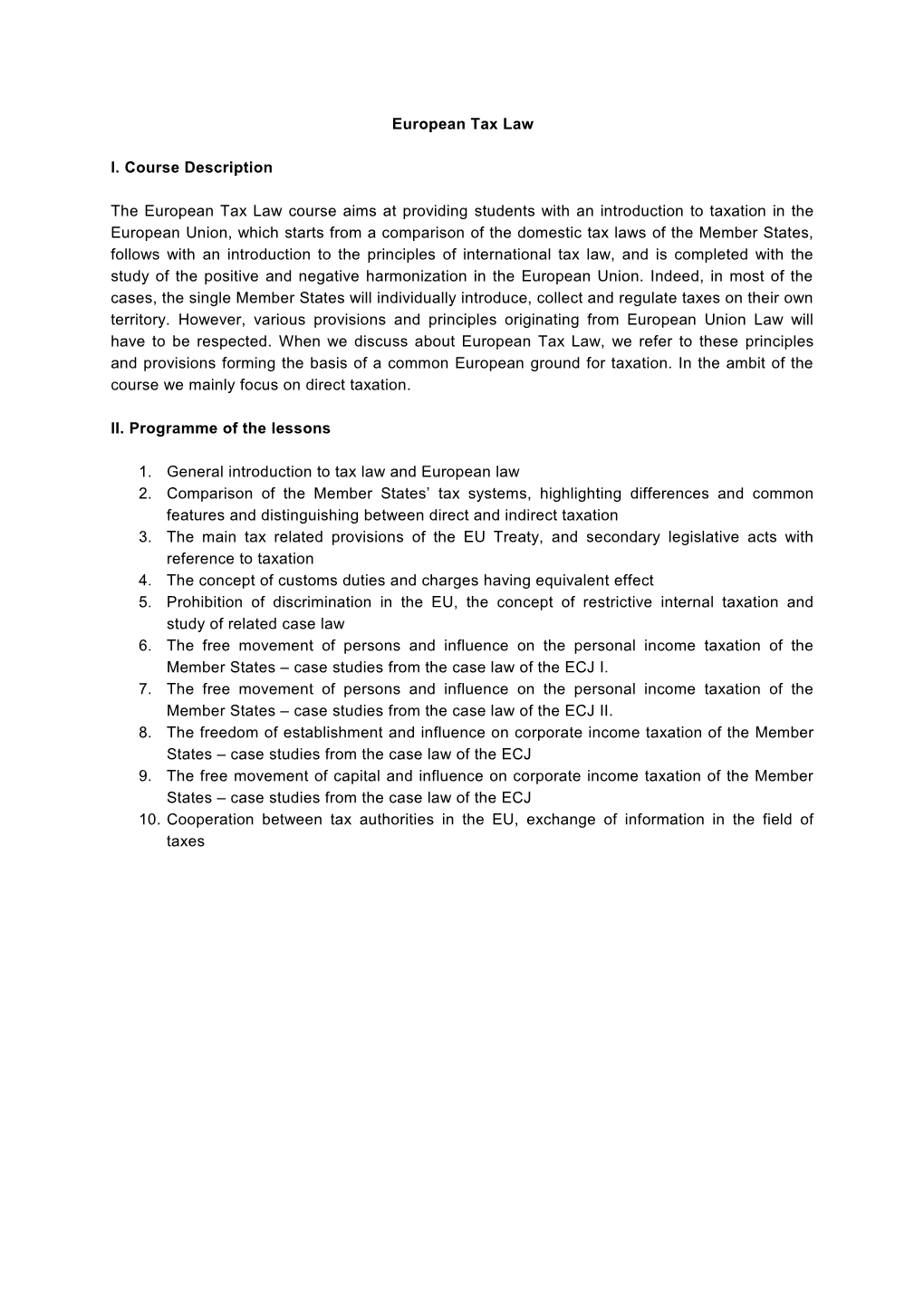European Tax Law
I. Course Description
The European Tax Law course aims at providing students with an introduction to taxation in the European Union, which starts from a comparison of the domestic tax laws of the Member States, follows with an introduction to the principles ofinternational tax law, and is completed with the study of the positive and negative harmonization in the European Union. Indeed, in most of the cases, the single Member States will individually introduce, collect and regulate taxes on their own territory. However, various provisions and principles originating from European Union Law will have to be respected. When we discuss about European Tax Law, we refer to these principles and provisions forming the basis of a common European ground for taxation.In the ambit of the course we mainly focus on direct taxation.
II. Programme of the lessons
- General introduction to tax law and European law
- Comparison of the Member States’ tax systems, highlighting differences and common features and distinguishing between direct and indirect taxation
- The main tax related provisions of the EU Treaty, and secondary legislative acts with reference to taxation
- The concept of customs duties and charges having equivalent effect
- Prohibition of discrimination in the EU, the concept of restrictive internal taxation and study of related case law
- The free movement of persons andinfluence on the personal income taxation of the Member States – case studies from the case law of the ECJ I.
- The free movement of persons and influence on the personal income taxation of the Member States – case studies from the case law of the ECJ II.
- The freedom of establishment and influence on corporate income taxation of the Member States – case studies from the case law of the ECJ
- The free movement of capital and influence on corporate income taxation of the Member States – case studies from the case law of the ECJ
- Cooperation between tax authorities in the EU, exchange of information in the field of taxes
Európai adójog
- Tárgyleírás
Az Európai adójog című tárgy célja, hogy megismertesse a hallgatókkal az Európai Unió adózási rendszerét, amely a nemzeti adójogok rövid összehasonlításával kezdődik, bemutatja a nemzetközi adózás legfontosabb alapelveit, és az Európai Unión belül megvalósuló pozitíy és negatív harmonizáció ismertetésével zárul. Valójában az esetek túlnyomó részében a tagállamok önállóan határozzák meg a területükön alkalmazottt adójogszabályokat, vetik ki és szedik be az adóterheket. Ugyanakkor, a tagállamoknak számos, az uniós jogból eredő rendelkezést és alapelvet kell betartaniuk. Amikor Európai adójogról beszélünk, akkor azalatt ezeket a közös rendelkezéseket és elveket értjük, melyek az adózás közös európai alapját képezik. A kurzus elsősorban a közvetlen adózás területével foglalkozik.
II. Tematika
- Általános bevezetés az adójogba és az Európai Unió jogrendszerébe
- A tagállami adórendszerek összehasonlítása, a főbb különbségek és hasonlóságok megvilágítása, a közvetlen és a közvetett adók közötti megkülönböztetésre is tekintettel
- Az EUMSZ főbb adózást érintő rendelkezései, a másodlagos jogforrások az adózás terén
- A vám és a vámokkal azonos hatású intézkedések tilalma
- Hátrányos megkülönböztetés és a korlátozó tagállami belső adózás tilalma, esetjog tanulmányozása
- A személyek szabad mozgása és annak hatása a tagállamok személyi jövedelemadó szabályozására – esetjogelemzés I.
- A személyek szabad mozgása és annak hatása a tagállamok személyi jövedelemadó szabályozására – esetjogelemzés II.
- A letelepedés szabadsága és annak hatása a tagállamok társasági adó szabályozására – esetjogelemzés
- A tőke szabad mozgása és annak hatása a tagállamok társasági adó szabályozására – esetjogelemzés
- A tagállami hatóságok közötti adóügyi együttműködés az EU-ban, információcsere az adózás terén
